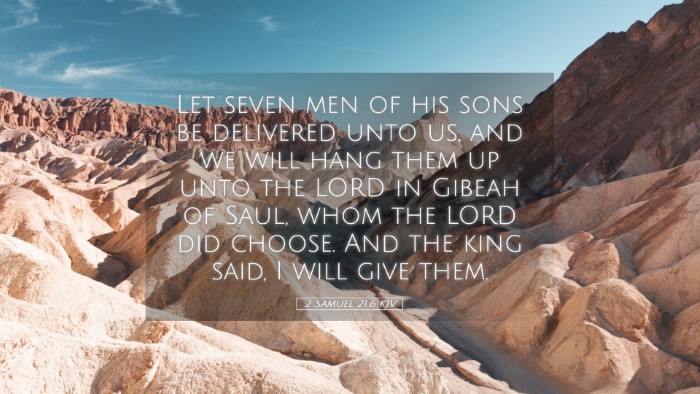Commentary on 2 Samuel 21:6
Verse Context: 2 Samuel 21:6 states, "Let seven men of his sons be delivered unto us, and we will hang them up unto the Lord in Gibeah of Saul, whom the Lord did choose." This verse takes place in a time of severe famine in Israel, attributed to Saul's unfaithfulness in killing the Gibeonites.
Historical Background
This passage reflects the ancient Near Eastern practice of seeking justice through punitive measures. The Gibeonites, who were wronged by Saul, demanded retribution, demonstrating the importance of covenant faithfulness.
Theological Insights
-
Justice and Retribution:
The demand for seven descendants of Saul to be handed over for execution underscores the principle of collective responsibility and the severity of Saul’s actions against the Gibeonites, illustrating God’s justice in addressing sins of the past.
-
Covenant Relationships:
The Gibeonites were part of a treaty with Israel, made during Joshua's time. Saul's violation of this covenant shows the serious implications of breaking oaths and the need for restoration.
-
Divine Sovereignty:
The phrase "whom the Lord did choose" indicates that Saul was not simply a king by human decision but by divine appointment. This illustrates that leaders will be held accountable before God, not just by human standards.
Commentary from Matthew Henry
Matthew Henry emphasizes the tragic consequences of sin that can extend beyond the immediate actor. He notes that the famine was a direct result of Saul’s actions, reminding readers that the land suffers alongside the consequences of spiritual unfaithfulness. Henry highlights the principle that iniquity can lead to generational repercussions, thus reflecting on the weight of moral choices made by leaders.
Commentary from Albert Barnes
Albert Barnes comments on the societal implications of Saul's atrocities against the Gibeonites, pointing out that the demand for retribution was both a reflection of cultural norms and a means of seeking justice for a wronged people. Barnes discusses the political aspect of these events: the necessity for David to restore order and appease the Gibeonites to bring an end to the famine, suggesting a complex interplay of mercy and justice in God's dealings with humanity.
Commentary from Adam Clarke
Adam Clarke provides a detailed analysis of the passage, noting the significance of the number 'seven' in biblical terms, representing completeness. Clarke reflects on the implications of such a sacrifice, examining whether it was a necessary evil to avert further calamity. He argues that the grim nature of the request illustrates the harsh reality of justice required by the covenant breaches and the seriousness with which God regards His promises.
Implications for Modern Theology
The passage invites contemporary theologians and believers to reflect on collective responsibility, the impact of leadership on community, and the nature of divine justice. It challenges current notions of grace by emphasizing that while God is merciful, He also upholds justice, ensuring that wrongdoing is addressed.
Practical Applications
-
Understanding Leadership:
In ministry contexts, leaders should be aware of the lasting impact of their actions on both the present community and future generations.
-
Restoration and Repentance:
This passage calls for accountability within the church, urging communities to pursue restoration and reconciliation with those they may have wronged.
-
Importance of Covenant:
Reinforced is the significance of covenants and promises, especially within the context of the Church’s relationship with God and the responsibilities that come with that relationship.
Conclusion
2 Samuel 21:6 serves as a somber reminder of the gravity of sin and its consequences. Through the lenses of the commentaries provided by Matthew Henry, Albert Barnes, and Adam Clarke, this text encourages leaders and believers alike to take seriously their commitments to God and to one another, emphasizing the importance of justice, mercy, and the enduring need for repentance.


